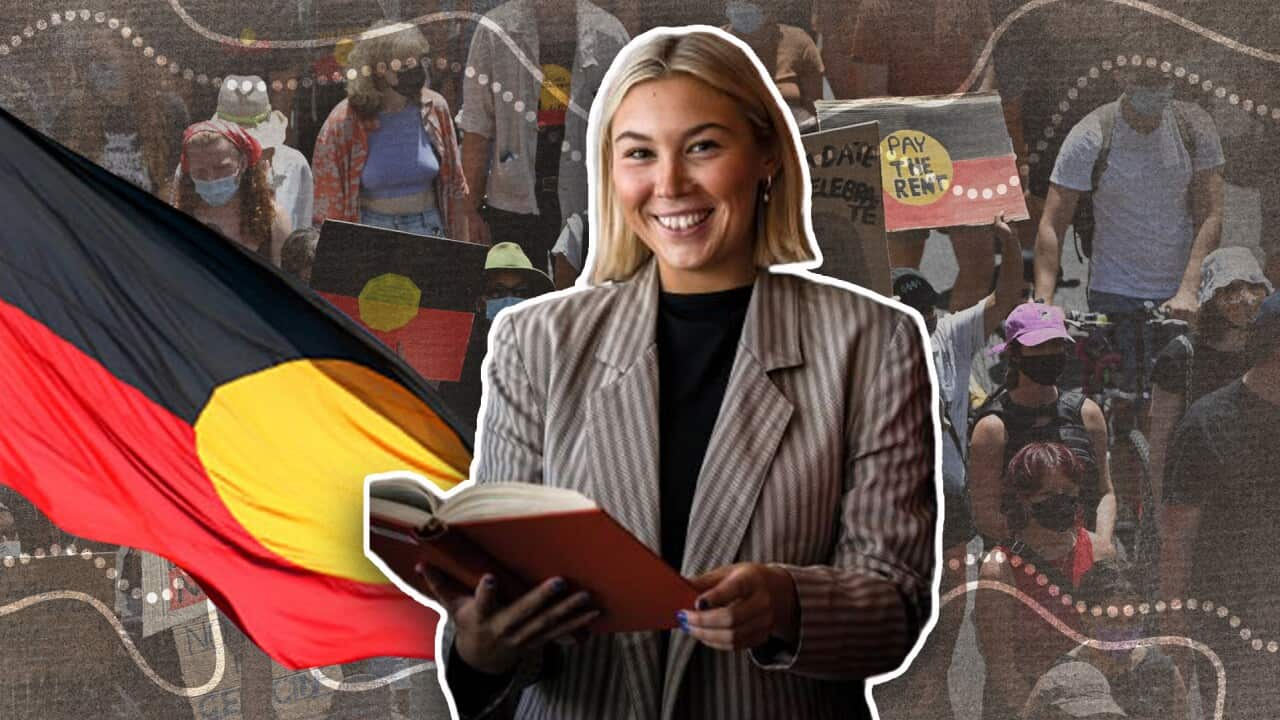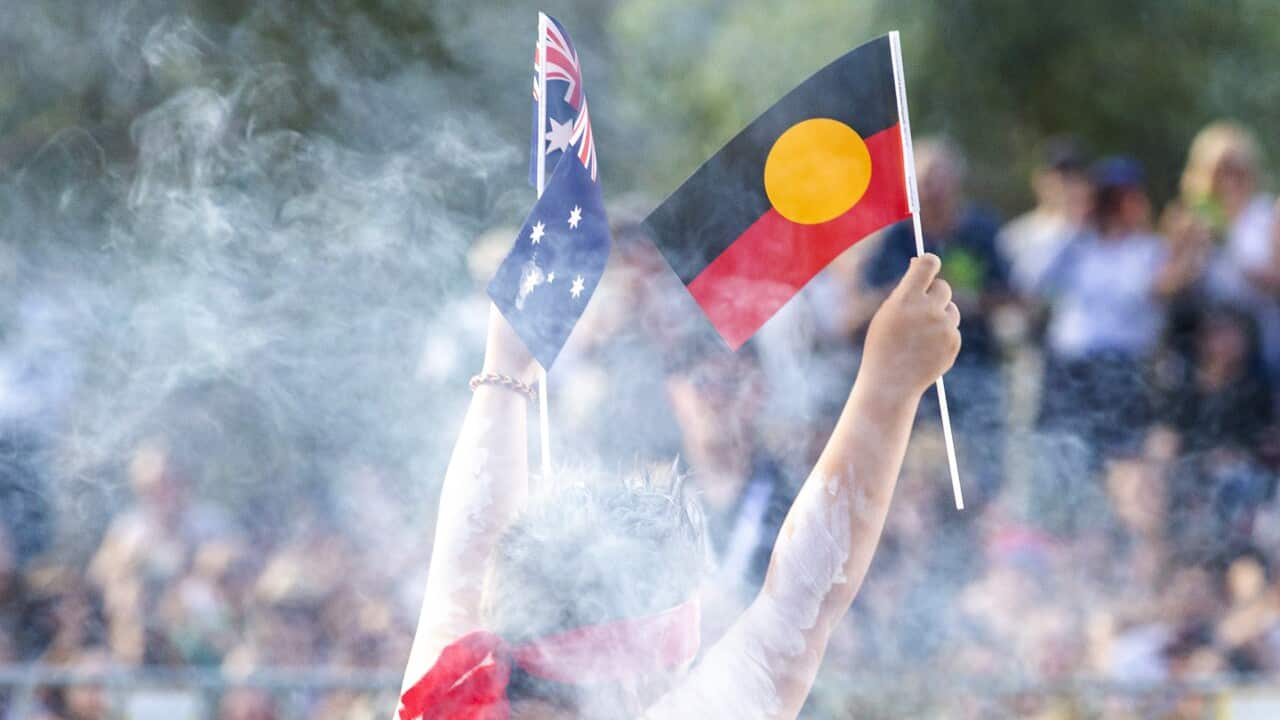Each year, on the morning of January 26 we, the palawa/pakana community gather, strong and proud, outside the Tasmanian Aboriginal Centre (TAC) to march down Elizabeth Street towards Parliament House.
This pathway carries profound importance.
On 7 January 1832, 25 resistance fighters walked this very path towards the Governor to negotiate the end of the ‘Black’ War.
These warriors, from the Oyster-Bay Big River nations, had courageously fought against white settlers for many years and survived the gruelling ‘Black’ Line.
They proudly walked down Elizabeth Street, all completely naked but standing tall with spears in hand, towards the enemy in the name of peace.

Community walk down Elizabeth Street towards Hobart Parliament. Source: Supplied
Almost 200 years later, we continue to retrace the steps of our ancestor’s ghosts, honouring their bravery and resilience.
My earliest Invasion Days
My earliest memories of embarking on this journey as a young luwana/girl all start at the Aboriginal Children’s Centre, where us youngens dedicated months to practising our chants, particularly those in palawa kani/Tasmanian Aboriginal language.
“They stole our land.
They stole our rights.
Blackfullas will fight, fight, fight.
We won’t stop.
We won’t go away.
We won’t celebrate Invasion Day.”

A young Maggie alongside a friend at one an Invasion Day rally. Source: Supplied
Our hearts would swell with pride for our community, country, and culture.
Yet, alongside that, there would be a prevailing sense of fear for our safety.
Facing abuse and violence
Since our protests began, our people have endured physical and verbal abuse, scorned and spat upon for our peaceful calls for justice.
Our people have been thrown into jail cells for simply standing up for their inherent rights.
Our people have disappeared, without a trace, for their passion and outrage of the colony.
Our history, soaked in blood, betrayal, and darkness, tells a tale of our enduring struggle.
The legacy of Granny Ducks
Yet, echoing the wisdom of my great-grandmother Granny Ducks, or Aunty Ida West AM, she instilled in palawa/pakana the poignant lesson; ‘
"Where the bad was, we always make it good.’"
In the face of adversity, she has instilled in us not only resilience but also the profound capacity to transform darkness into light.
She, among many matriarchs, ensured we were raised on the richness of our community’s fighting spirit.
It should come as no surprise that this generation of palawa/pakana have grown up as sovereign peoples defined by unwavering strength and pride.
We are still here
Today we are emerging as leaders.
We represent our community as artists, performers, doctors, lawyers, artists, scientists, protectors of country, culture, and language, and more.
Above all we hold firmly onto the belief that we owe this all to our old fullas whose shoulders we stand on.
The settler colony has attempted to wipe out the palawa/pakana, however, we still stand here today.

Maggie Blanden Source: Supplied
We will not celebrate ‘Australia’.
‘Australia’ ensures our people are the most incarcerated people on this planet.
‘Australia’ removes our babies from their homes disproportionately and guarantees that our children are more likely to end up in a prison cell than in higher education.
‘Australia’ prefers to ignore our ancient knowledges of caring for Country and ecology, and instead destroys our homelands and heritage.
‘Australia’ refuses our continuing existence, culture, language, and access to our land.
January 26th is the date that the settlers first flew the Union Jack to mark their possession or unlawful invasion of our lands.
Therefore, Invasion Day is our annual reminder that ‘Australia’ is built upon a false declaration of terra nullius and that the settler law of this country does not reflect the overwhelming truth that our sovereignty was never ceded.
We fight for Treaty
This Invasion Day, we remind you of your role to continue reflecting on your place in a colony that is built upon the violent legacy of genocide and the privilege that you hold in this.
Most importantly, you must remember that nothing is more worthy of a day of celebration than a Treaty for us in lutruwita.

Maggie learnt staunch, powerful advocacy from her Elders, including her late Pop, Darrell West. Source: Supplied
A Treaty acknowledges that this land has been twice stolen.
We will continue to march down Elizabeth Street to remind the colony that it has failed in its mission, for as long as it takes.
We are here and we are not going away.
Always was, always will be palawa/pakana land.
Maggie is a proud young palawa woman from lutruwita/Tasmania. She is an advocate for Indigenous self-determination, sovereignty, climate justice, land return and cultural management and campaigns against domestic, family and sexual violence. She is a member of the Global Institute for Women's Leadership (GIWL) Youth Advisory Committee and a founder of the Naarm Law Students on the Voice, which saw her recognised as a finalist in the 2023 Australian Human Rights Awards.
















